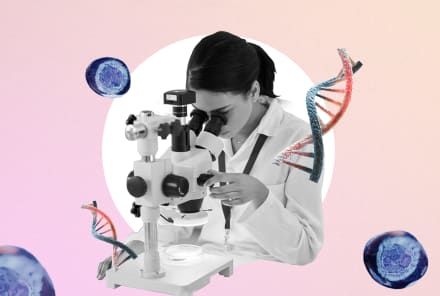Advertisement
The Mineral Deficit That's Making You Gain Weight


We've been told for decades to hold the salt at the dinner table for the sake of our hearts and blood pressure1. But salt moderation and restriction are two very different things. The anti-salt campaign has people anti-salt and has blurred the picture about what salt actually does for us—besides making everything taste better.
Salt is made up of sodium chloride. Sodium is an essential mineral, “essential” meaning we must consume it from our diet, since our bodies can’t synthesize it. Sodium has many vital functions in the body, which I go into more in my book, The Salt Fix. Since we lose salt every day through sweat and urine, we need to consume some salt in order to live.
Sodium is an essential dietary macromineral with critical functions2 in the body, including but not limited to:
- Electrolyte balance
- Extracellular fluid volume balance
- Blood pressure
- Membrane potential
- Nerve transmission
- Muscle contraction
- Cardiac and kidney function
- Nutrient absorption and transport
What happens when we aren't getting the salt we need?
There’s science that clearly demonstrates what happens when we’re salt hungry3. Hormonal and brain feedback circuits kick in.
When we become depleted in salt, the brain seems to react by sensitizing the reward system—and not just the reward system for salt, but the same reward system4 that drives us to other pleasurable activities. The purpose of that sensitization3 is that when we eat salt it induces a greater reward than usual, leading to an increased intake of salt.
This organic appetite for salt and primitive "reptilian" response in the brain is over 100 million years old5 and it has carried over from our ancient ancestors. Its goal is to keep us alive by preventing or quickly fixing a salt deficit (or major salt deficiency, AKA hyponatremia6) in the body. In other words, the brain controls our salt fix.
In our modern world, though, this intrinsic reward system, intended to save our lives from salt deficit, could be inadvertently contributing to weight gain, and even obesity.
How? For starters, consuming a very low salt diet increases your risk of salt depletion and hence a hyperactive reward system in the brain. During ancient times we weren’t surrounded by hyper-palatable foods to satisfy this reward. In our current food environment, however, this sensitized reward system can now be "hijacked."
For example, that piece of chocolate cake or candy bar may provide an enhanced reward, leading to an increased consumption of sweets. In other words, low-salt diets may cause “collateral damage” through hedonic craving and eating of sweet, sugary foods, which are calorically dense and contribute to weight gain and other metabolic dysfunction.
That other “white crystal” (sugar) might be the problem.
The low-salt advice may be one reason why approximately 75 percent of all packaged foods7 in the United States contain added sugars. And a higher intake of refined sugar is associated with an increased risk of weight gain or obesity8. This may explain why cultures with higher salt but lower sugar intake (e.g. Japanese) have significantly lower obesity rates than the United States.
And while salt’s gotten a bad rap when it comes to the heart (more on that later), it turns out that sugars are strongly linked to increased risk for hypertension and cardiometabolic disease9.
How much salt do I need?
The National Academy of Medicine set the daily sodium requirement at 1,500 mg per day for adults. That equals 3.8 grams per day of sodium chloride (salt), since sodium makes up about 40 percent of salt.
I personally believe that there is an inherent drive for humans to consume a higher amount of sodium than is currently recommended. This level may be around 3,000 to 4,000 mg of sodium every day. The average sodium intake10 in U.S. adults is currently 3,273 milligrams per day, which falls in my preferred range.
With that being said, we’re all unique and so are our nutritional needs. When sodium intake is in excess of personal needs or a person is sodium-sensitive11 (i.e., blood pressure increase from salt intake is higher than normal) because of their genetic makeup, a reduction in salt intake is clinically warranted and should be monitored by the patient's doctor.
Reducing sodium intake is tied to a reduction in blood pressure, and this relationship has particular relevance for patients with hypertension, diabetes mellitus, and kidney disease.
Less (salt) might be more (obesity).
Regardless of your personalized sodium cutoff, the widespread use of "low-salt" versions of foods scattered across the grocery aisles does not fully satisfy our built-in salt penchant. So instead of eating one bag of salty chips or popcorn, you may end up eating three bags of the "low-salt" versions to obtain the salt your body desires.
In other words, low-salt foods may translate into a greater intake of chips, popcorn, or pretzels, for example, predisposing us to weight gain through their excess caloric burden.
Also, let’s not forget the impact of sodium on insulin, the fat-storing hormone. Since insulin also helps the body to retain more salt, low-salt diets can increase insulin levels12, potentially increasing the amount of fat you store with each calorie you consume. Low-salt diets have also been found to promote insulin resistance13, a major culprit for metabolic dysfunction, setting up the trajectory for type 2 diabetes.
Eating the salt your body craves may be an easy strategy to also reduce your intake of, and perhaps even desire for, sugar and refined carbohydrates. Consuming a normal salt diet (in my opinion, around one and a half teaspoons of salt per day) may help support normal insulin levels.
Nutrients don't exist in isolation.
One last point: It doesn't make sense to single out sodium when it comes to discussions about blood pressure. Remember that there are other nutrient imbalances that contribute to hypertension (e.g., too much sugar9, not enough potassium14, not enough calcium15). Thus, holistic consideration of a nutrient-dense diet is more appropriate, like that seen in the DASH diet16.
Pass the salt, please.
Adding more salt to your diet could be a solution for healthy weight loss. Also consider that salt allows bitter foods such as nuts, seeds, and vegetables to taste sweeter. Ask any chef about the importance of salt. It’ll help you to enjoy and eat more of these healthy foods.
So for the sake of our waistlines, don’t fear the salt shaker. Instead, consume less of the other white crystal: sugar. The secret to health is simple: Eat real food and salt to taste.
16 Sources
- https://www.ncbi.nlm.nih.gov/pmc/articles/PMC6770596/
- https://lpi.oregonstate.edu/mic/minerals/sodium
- https://www.ncbi.nlm.nih.gov/pmc/articles/PMC4433288/
- https://pubmed.ncbi.nlm.nih.gov/15301923/
- https://www.ncbi.nlm.nih.gov/pmc/articles/PMC3145743/
- https://www.ncbi.nlm.nih.gov/books/NBK470386/
- https://www.ncbi.nlm.nih.gov/pmc/articles/PMC3490437/
- https://www.ncbi.nlm.nih.gov/pmc/articles/PMC6959843/
- https://pubmed.ncbi.nlm.nih.gov/25717381/
- https://www.amjmed.com/article/S0002-9343(19)30427-9/fulltext
- https://www.ncbi.nlm.nih.gov/pmc/articles/PMC6116721/
- https://www.ncbi.nlm.nih.gov/pmc/articles/PMC4336531/
- https://www.ncbi.nlm.nih.gov/pmc/articles/PMC3036792/
- https://www.ncbi.nlm.nih.gov/pmc/articles/PMC4530669/
- https://www.ncbi.nlm.nih.gov/pmc/articles/PMC6566648/
- https://www.ncbi.nlm.nih.gov/books/NBK482514/
Watch Next
Enjoy some of our favorite clips from classes
Enjoy some of our favorite clips from classes
What Is Meditation?
Mindfulness/Spirituality | Light Watkins
Box Breathing
Mindfulness/Spirituality | Gwen Dittmar
What Breathwork Can Address
Mindfulness/Spirituality | Gwen Dittmar
The 8 Limbs of Yoga - What is Asana?
Yoga | Caley Alyssa
Two Standing Postures to Open Up Tight Hips
Yoga | Caley Alyssa
How Plants Can Optimize Athletic Performance
Nutrition | Rich Roll
What to Eat Before a Workout
Nutrition | Rich Roll
How Ayurveda Helps Us Navigate Modern Life
Nutrition | Sahara Rose
Messages About Love & Relationships
Love & Relationships | Esther Perel
Love Languages
Love & Relationships | Esther Perel
What Is Meditation?
Box Breathing
What Breathwork Can Address
The 8 Limbs of Yoga - What is Asana?
Two Standing Postures to Open Up Tight Hips
How Plants Can Optimize Athletic Performance
What to Eat Before a Workout
How Ayurveda Helps Us Navigate Modern Life
Messages About Love & Relationships
Love Languages
Advertisement

I Fall Asleep Within 5 Minutes When I Follow This Simple Routine
Maya Feller, M.S., R.D., CDN

This Underconsumed Nutrient Helps Fight Gum Inflammation, Study Shows
Molly Knudsen, M.S., RDN

Research Shows Cognitive Longevity Depends On These 3 Critical Vitamins
Molly Knudsen, M.S., RDN

This Lowers Signs Of Inflammation After Menopause, Study Finds
Molly Knudsen, M.S., RDN

I Fall Asleep Within 5 Minutes When I Follow This Simple Routine
Maya Feller, M.S., R.D., CDN

This Underconsumed Nutrient Helps Fight Gum Inflammation, Study Shows
Molly Knudsen, M.S., RDN

Research Shows Cognitive Longevity Depends On These 3 Critical Vitamins
Molly Knudsen, M.S., RDN

This Lowers Signs Of Inflammation After Menopause, Study Finds
Molly Knudsen, M.S., RDN

I Fall Asleep Within 5 Minutes When I Follow This Simple Routine
Maya Feller, M.S., R.D., CDN

This Underconsumed Nutrient Helps Fight Gum Inflammation, Study Shows
Molly Knudsen, M.S., RDN

Research Shows Cognitive Longevity Depends On These 3 Critical Vitamins
Molly Knudsen, M.S., RDN

This Lowers Signs Of Inflammation After Menopause, Study Finds
Molly Knudsen, M.S., RDN

I Fall Asleep Within 5 Minutes When I Follow This Simple Routine
Maya Feller, M.S., R.D., CDN

This Underconsumed Nutrient Helps Fight Gum Inflammation, Study Shows
Molly Knudsen, M.S., RDN

Research Shows Cognitive Longevity Depends On These 3 Critical Vitamins
Molly Knudsen, M.S., RDN

This Lowers Signs Of Inflammation After Menopause, Study Finds
Molly Knudsen, M.S., RDN










